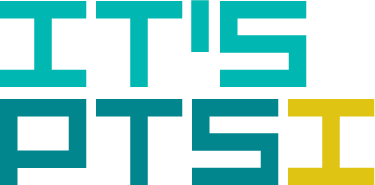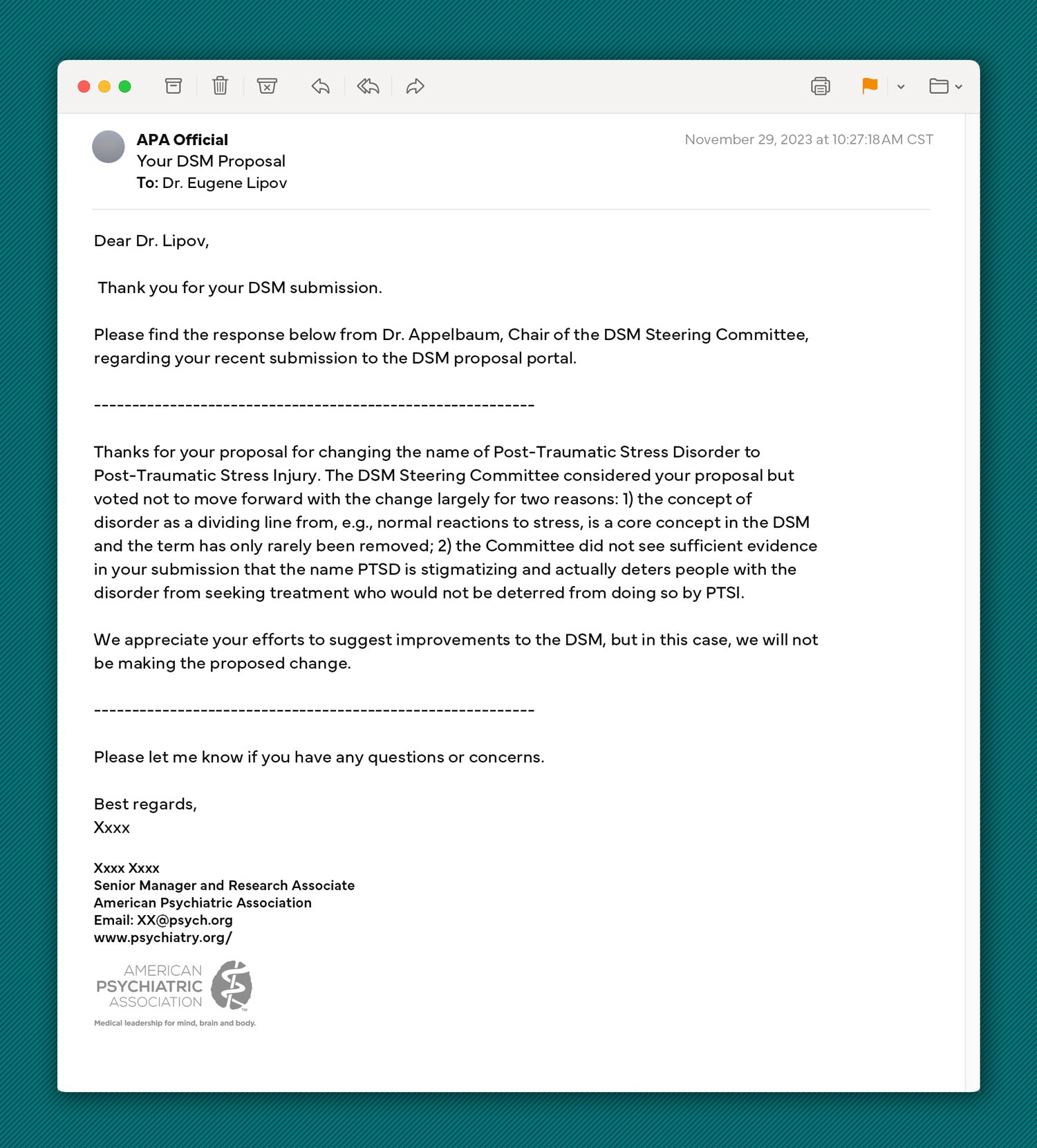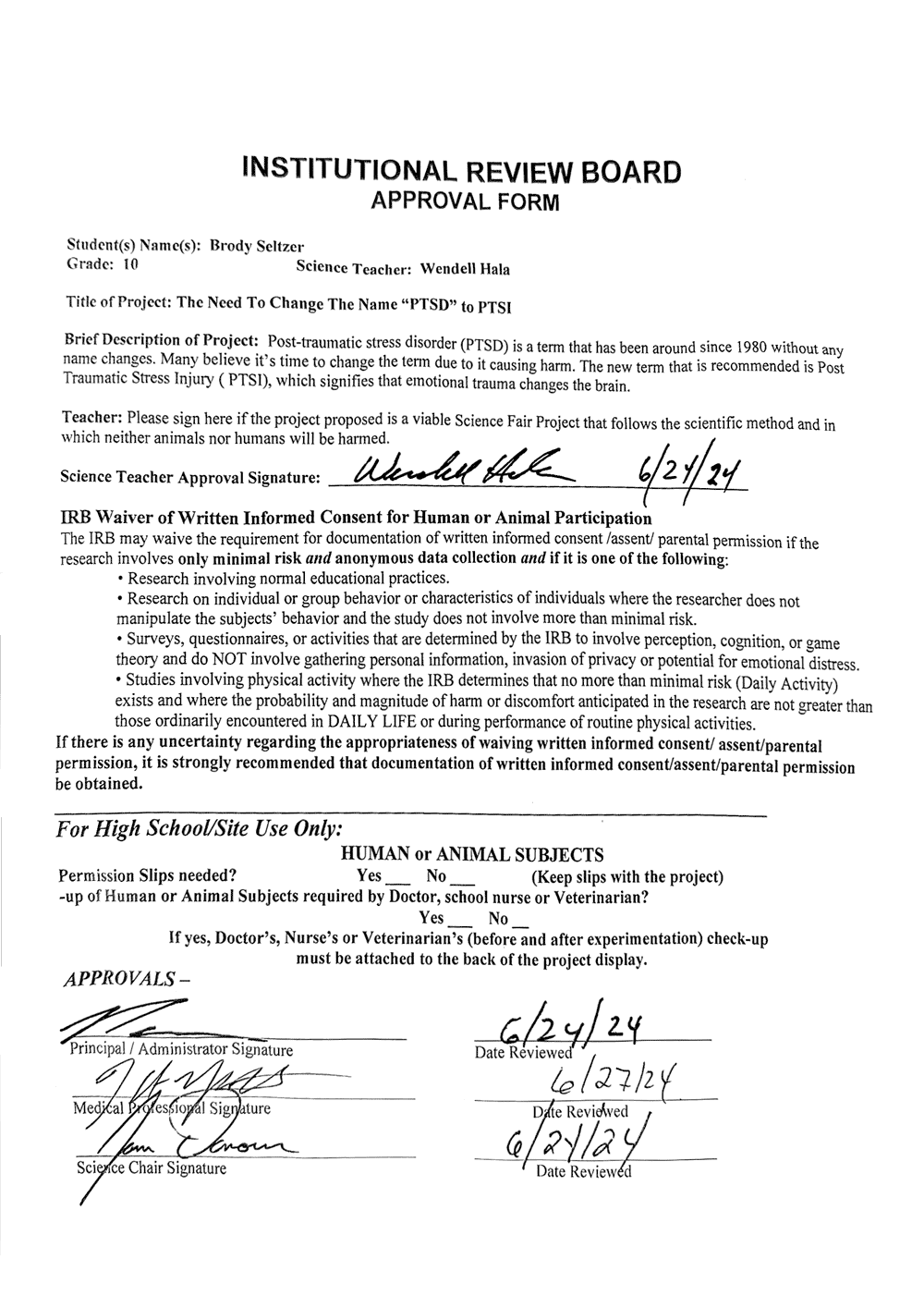Our pursuit to
change PTSD to
PTSI continues

Our pursuit to
change PTSD to
PTSI continues
dr. eugene lipov responds
to the American Psychiatric
Association’s decision
“It’s NOT clear what normal
reaction to stress is — suicide
is, clearly, NOT normal.”
Dr. Eugene Lipov is a board-certified anesthesiologist and pain physician, pioneer and researcher of post-traumatic stress treatment, advocate for PTSI to replace PTSD, Chief Medical Officer at Stella, author and speaker.
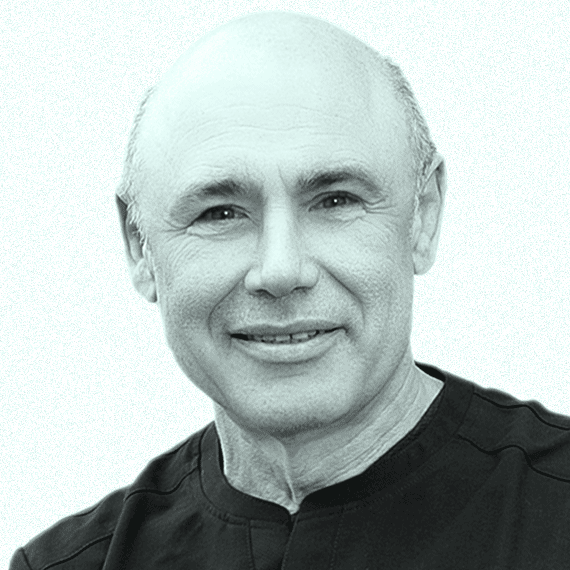
dr. eugene lipov responds
to the American Psychiatric
Association’s decision
“It’s NOT clear what
normal reaction to
stress is — suicide is,
clearly, NOT normal.”

Dr. Eugene Lipov is a board-certified anesthesiologist and pain physician, pioneer and researcher of post-traumatic stress treatment, advocate for PTSI to replace PTSD, Chief Medical Officer at Stella, author and speaker.
General Peter Chiarelli (Ret.)
on the connection between
a “disorder” and stigma
“[military] service men and
women…suffer in silence rather
than endure that label…”

General Peter Chiarelli (Ret.)
on the connection between
a “disorder” and stigma
“[military] service men
and women… suffer in
silence rather than
endure that label…”

General Peter Chiarelli was Vice Chief of Staff of the U.S. Army until he retired from the U.S. Army in early 2012. Today, he remains an Ambassador for the cause.
stay up-to-date
Subscribe to ItsPTSI.com mailing list for exclusive updates on advocacy efforts, recently published studies that are relevant to treatment of post-traumatic stress, resources and more.
He once helped define PTSD. Then, he became
a compelling voice for a shift to recognize
the condition as an injury.
Dr. Frank Ochberg
Dr. Frank Ochberg is a founding father of trauma science. He defined the term “Stockholm Syndrome” for the FBI — a condition where hostages develop a psychological / emotional bond with their captors. It has since been applied to victims of child abuse, coach-athlete abuse, relationship abuse and sex-trafficking.
In 1980, Dr. Ochberg was on the committee that originally defined “PTSD” (for post-traumatic stress) as an operational diagnosis. Over the years, though, his thoughts about the condition evolved. Informed by further study and advances in technology, he concluded that severe trauma is not a “disorder,” but rather a physical “injury.”
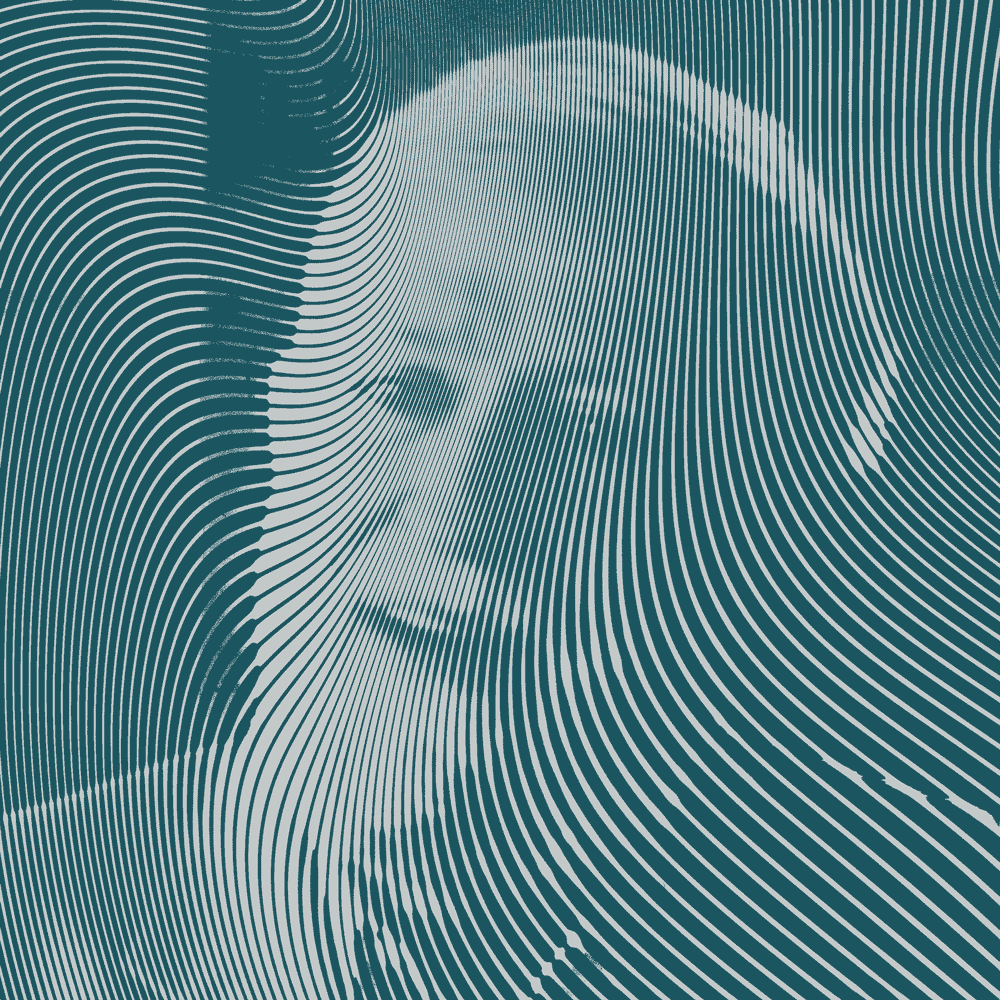
here’s what you can do…
tell the senate
that we want
a hearing
All it takes is a few minutes of your time to make your voice heard. Request a hearing before U.S. Senate Committee on Veterans’ Affairs, demanding that the American Psychiatric Association publicly explain their position. Post-traumatic stress is an injury and removing the stigma around the so-called “disorder” will save lives.
the song
“It’s PTSI”
“It’s PTSI”
Conceived of by Dr. Eugene Lipov, “It’s PTSI” is an uplifting, poetic representation of the medical science. Award-winning musical artist Chase Bell crafts a culturally relevant tune, sonically striking the right mood;. The poignant lyrics are delivered beautifully, by Kia Knoester. Listen below and find it on Apple Music and iTunes.
loud and clear!
loud and clear!
The public service announcement (PSA) from Erase PTSD Now! that helped launch the campaign to change the name.
The public service announcement (PSA) from Erase PTSD Now! that helped launch the campaign to change the name.
here’s what you can do…
tell the senate
that we want
a hearing
All it takes is a few minutes of your time to make your voice heard. Request a hearing before U.S. Senate Committee on Veterans’ Affairs, demanding that the American Psychiatric Association publicly explain their position. Post-traumatic stress is an injury and removing the stigma around the so-called “disorder” will save lives.
the song
“It’s PTSI”
Conceived of by Dr. Eugene Lipov, “It’s PTSI” is an uplifting, poetic representation of the medical science. Award-winning musical artist Chase Bell crafts a culturally relevant tune, sonically striking the right mood;. The poignant lyrics are delivered beautifully, by Kia Knoester. Listen below and find it on Apple Music and iTunes.
He once helped define PTSD. Then, he became a important advocate to recognize the condition as it is, an injury.
Dr. Frank Ochberg
Dr. Frank Ochberg is a founding father of trauma science. He defined the term “Stockholm Syndrome” for the FBI — a condition where hostages develop a psychological / emotional bond with their captors. It has since been applied to victims of child abuse, coach-athlete abuse, relationship abuse and sex-trafficking.
In 1980, Dr. Ochberg was on the committee that originally defined “PTSD” (for post-traumatic stress) as an operational diagnosis. Over the years, though, his thoughts about the condition evolved. Informed by further study and advances in technology, he concluded that severe trauma is not a “disorder,” but rather a physical “injury.”

THE MISSION
The mission of ItsPTSI.com is to facilitate a change to the label of post-traumatic stress from “PTSD” to “PTSI,” by lobbying medical organizations (like the American Psychiatric Association) and governing bodies (local, state, federal) — to officially recognize the condition as an “injury.”
Success of this mission, as defined above, will hasten societal shift as part of a cascading effect, exponentially improving the lives of PTS survivors everywhere. As the movement for change grows, this website hopes to help consolidate the (currently) disparate initiatives around the country — and the world — that are already working to effect a shift from “disorder” to “injury,” while providing a de facto clearinghouse of PTSI-relevant information and organizing functions.
Realization of this campaign to change the label to PTSI is an important step, but not the only factor that will help erase stigma and lead to making effective treatment available to all who need it. If/when success is achieved at changing how the diagnosis is officially understood and labeled, that may eventually influence — directly or indirectly — the acceptance within the healthcare system (regarding insurance coverage, etc.), but we’ll refrain from addressing that, for now.
Dr. Lipov’s innovative work with Stellate Ganglion Block therapy has transformed the way PTSD is treated. For more information about his clinical research, treatment methods, and professional expertise, visit Dr. Eugene Lipov’s official website.
ABOUT
The mission of ItsPTSI.com is to facilitate a change to the label of post-traumatic stress from “PTSD” to “PTSI,” by lobbying medical organizations (like the American Psychiatric Association) and governing bodies (local, state, federal) — to officially recognize the condition as an “injury.”
Success of this mission, as defined above, will hasten societal shift as part of a cascading effect, exponentially improving the lives of PTS survivors everywhere. As the movement for change grows, this website hopes to help consolidate the (currently) disparate initiatives around the country — and the world — that are already working to effect a shift from “disorder” to “injury,” while providing a de facto clearinghouse of PTSI-relevant information and organizing functions.
Realization of this campaign to change the label to PTSI is an important step, but not the only factor that will help erase stigma and lead to making effective treatment available to all who need it. The movement may also eventually influence — directly or indirectly — the acceptance within the healthcare system (insurance companies, etc.)
